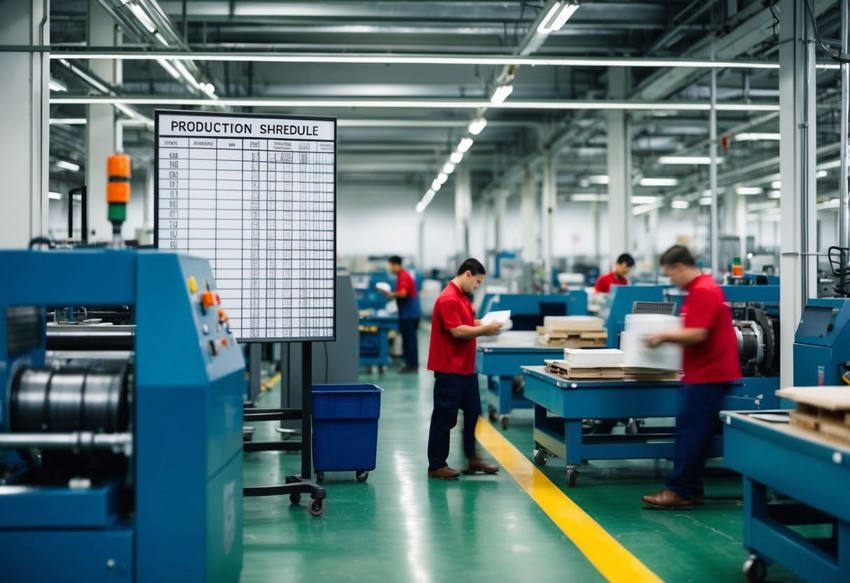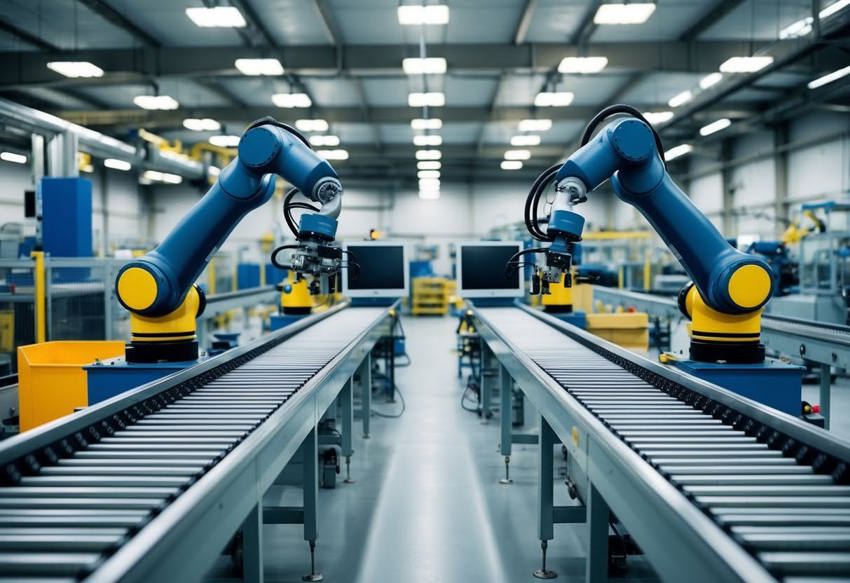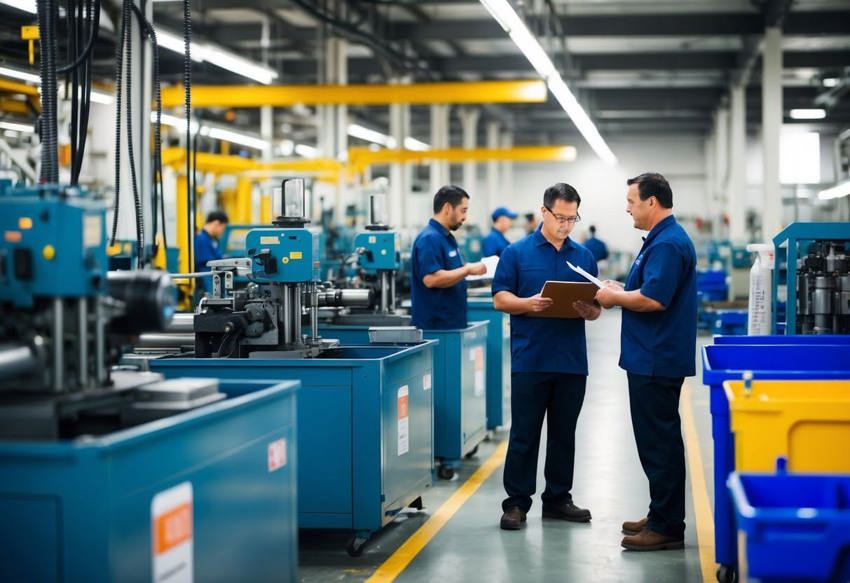What’s New in Business Central 2025 Release Wave 2
The Autumn brings the second major release of the year for Business Central, as part of the 2 wave annual update cycle. Here we look at the highlight features.
Your ERP system can be a powerful tool to streamline your business' manufacturing processes. By integrating diverse functions such as inventory management, production planning and quality control, an ERP system helps reduce operational costs and enhance productivity. This sets the stage for better decision-making and faster response times, which are crucial in a competitive market.

ERP systems provide a unified view of all aspects of your manufacturing operations, from supply chain management to shop floor activities. With real-time insights and data-driven decisions, you can improve processes, maximise productivity and manage costs more effectively. As a result, your company can better meet customer demands and adapt swiftly to market changes.
Making the right investment in an ERP system tailored to the manufacturing industry can significantly improve your business's efficiency. It's not just about automating tasks; it's about revolutionising how you manage and execute your operations. With the right system in place, you can streamline production workflows and ensure precision in cost and inventory management, making your business more resilient and agile.
Enterprise resource planning (ERP) systems play a crucial role in manufacturing by integrating various functions and streamlining processes. These systems bring together operations like planning, inventory management and production scheduling, allowing manufacturers to increase efficiency and make more informed decisions.
ERP systems like Dynamics 365 Business Central offer several essential features tailored for manufacturing. One key feature is inventory management, helping you track raw materials and manage stock levels efficiently. Production planning is another key component, enabling you to schedule manufacturing activities and optimise resource use.
Quality control systems standardise processes, ensuring product consistency. Supply chain management keeps track of suppliers and shipments, ensuring timely delivery of materials. Reporting tools provide detailed analytics, helping you monitor performance and adjust strategies quickly. An ERP system keeps your manufacturing operations agile and responsive.
ERP systems support many types of manufacturing processes, helping you manage operations across different methods. At the more straightforward end, process manufacturing, which is the method of using a predefined formula to manufacture items in bulk, can be made more efficient through the use of an ERP system, with the ability to reduce manual repetitive tasks and maintain quality control..
For environments like discrete manufacturing, where individual components of items are standalone objects, ERPs help in custom order tracking and assembly line management. On a bigger scale, project manufacturing, which is the process of building large and unique (but often similar) products like custom yachts, flexible scheduling and resource allocation features of ERP systems support the individual nature of these products.
An ERP system can streamline production workflows by coordinating and monitoring every stage of the manufacturing process. This system not only enhances efficiency but also maintains consistent product quality, ensuring that all aspects from raw materials to finished products meet the required standards.

Managing the journey of raw materials through each stage until they become finished products helps maintain quality. With an ERP system, you can track each material layer and its transformation. This allows for precise inventory management, reducing waste and ensuring that every batch manufacturing process uses materials efficiently.
The ERP system provides real-time data, helping you adjust orders as needed. You can foresee potential supply chain disruptions and respond proactively. This system keeps all processes in sync, ensuring the seamless flow of granule materials through production, which results in a smooth transition to finished products.
The effectiveness of your assembly lines influences your overall production success. An ERP system streamlines operations, ensuring each segment of the line works in harmony. By analysing data on machine performance and workforce productivity, you can identify bottlenecks and areas needing improvement.
Automation within ERP systems simplifies repetitive tasks, making it easier to handle a wide range of manufacturing types. For example, in complex processes like batch manufacturing, the system ensures consistency and reduces errors.
Your ERP system also allocates resources efficiently, aligning every part of the production process. This approach maximises assembly line efficiency and ensures timely completion of products while maintaining high standards of product quality.
Advanced manufacturing solutions improve productivity by optimising processes and enhancing design capabilities. You can achieve more efficient production and better product quality by strategically using your ERP system.

Using advanced manufacturing processes, you have the ability to refine your product designs with precision. Technologies like 3D printing build products layer by layer, allowing you to produce intricate designs with detailed specifications. This method not only increases accuracy but also reduces waste, as you only use the materials necessary for each layer.
Adopting computer-aided design (CAD) software can further boost your design capabilities. This tool helps you visualise complex structures and simulate real-world performance, reducing the need for physical prototypes. By streamlining the entire manufacturing process, you can meet exact product specifications, resulting in higher manufacturing output and customer satisfaction.
Incorporating innovative strategies, such as the use of advanced machinery, increases production volumes while maintaining high quality. Automation technologies allow you to reduce reliance on manual labour, offering the opportunity for continuous production cycles and minimising human error. Robotic systems are particularly beneficial in repetitive tasks, ensuring consistency and speed.
Integrating an ERP system enhances your ability to track production data in real-time. This integration enables you to make informed decisions, ensuring that resources are allocated efficiently and bottlenecks are quickly addressed. These strategies allow you not only to improve efficiency but also to remain competitive in an evolving market, ultimately boosting your manufacturing output.
In the complex world of manufacturing, precisely managing costs and inventory is essential. By leveraging an ERP system, you can enhance efficiency, reduce operational expenses and better align production with customer demand.
Effective inventory management helps with cost savings. With an ERP system, you can maintain optimal stock levels, avoiding both overstocking and shortages. This balance not only reduces storage costs but ensures your stock doesn't go out of date quickly.
By using activity-based costing, you track indirect costs accurately, ensuring a more precise allocation to products. This enables you to identify areas for cost reduction, improving profit margins. Furthermore, automated tracking of components can minimise waste and optimise turnover, lowering operational costs in the process.
Matching your manufacturing processes to customer demand is vital for operational success. An ERP system helps forecast demand more accurately, adjusting production schedules to meet customer needs promptly. This ensures that you concentrate resources where they're most needed, reducing unnecessary expenses.
By integrating customer data into your system, you gain insights that lead to better product offerings and customer satisfaction. This not only helps in avoiding costly overproduction but also aligns your stock levels with market demand, enhancing overall efficiency. You can optimise your supply chain to further reduce unnecessary expenditures, maintaining a lean and responsive operation.
An ERP system can transform various manufacturing processes by enhancing production planning, improving inventory management, and optimising supply chain functions. Automating tasks such as quality control and procurement streamlines operations, while product lifecycle management becomes more efficient with the right ERP tools.

By integrating data from across the company, an ERP system helps you manage production schedules more accurately. This leads to reduced downtime and improved resource allocation. With real-time visibility, you can quickly adjust to changes in demand, ensuring that production stays on track and meets deadlines effectively.
An ERP solution gives you greater control over inventory by offering real-time tracking and analysis. It can automatically update inventory levels, reducing the chances of stockouts and overstocking. You gain insights into inventory turnover rates, helping you make informed decisions about purchasing and storage.
Automating quality control processes with an ERP system ensures consistent product quality and reduces manual errors. Detailed reports and analytics allow you to identify defects early, improving overall production standards. You can set quality benchmarks and easily track compliance, leading to better customer satisfaction and fewer returns.
An ERP system simplifies procurement by consolidating supplier information and automating purchase orders. You can compare quotes faster, track supplier performance and ensure compliance with contracts. This leads to cost savings and improved supplier relationships. Efficient procurement processes also mean less disruption to production schedules.
The Autumn brings the second major release of the year for Business Central, as part of the 2 wave annual update cycle. Here we look at the highlight features.
After a recent visit to the Digital Manufacturing 2day event in Coventry and an insightful presentation by Lord Chris Holmes, I thought I would delve a bit deeper into the current AI regulation facing UK industry.
Choosing the right ERP system when moving on from Sage 50 can shape how efficiently your business grows and adapts. If you want advanced features, greater flexibility and easier integration with familiar Microsoft tools, Microsoft Dynamics 365 Business Central is often the stronger option compared to Sage 200. As real-time data insight, automation and scalability are now necessities and not luxuries, your ERP upgrade decision is more important than ever.